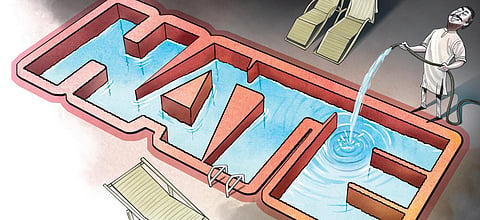

The Supreme Court, in an unprecedented move, interdicted Sudarshan television channel from telecasting a programme called ‘Bindas Bol - UPSC Jihad’. Many felt that the telecast was targeted against a particular religious community. A Bench led by Justice Chandrachud is dealing with the legal and constitutional aspects of ‘hate speech’ in the media at large. The task before the court is to draw the subtle yet important distinction between free speech and hate speech.
British Parliamentarian Bhikhu Parekh said that “(hate speech) lowers the tone of public debate, coarsens the society’s moral sensibility and weakens the culture of mutual respect”. He explained that it “violates the dignity of the target group by stigmatising them, denying their capacity to live as responsible members of the society”. The Indian Supreme Court cautioned about the vices of hate speech in Baburao Patel’s case (1980) and the Pravasi Bhalai Sangathan case (2014).
Statutes against hate speech are not uncommon in liberal democracies. Section 14 of the Saskatchewan Human Rights Code in Canada prohibits publications that instigate hatred. India does not have a separate law on hate speech, although one can trace facets of it in different enactments including the Indian Penal Code (IPC). Rule 6 of the Cable Television Network Rules, 1994, prohibits programmes that offend “good taste or decency” or contain matters “contemptuous of religious groups” or promoting “communal attitudes”.
Also there are other variants of hate speech enumerated in the rule, though the phrase ‘hate speech’ is not used. Section 5 of the Cable Television Act speaks about programme code, which, if violated, can invite punishment as provided under Section 16 of the Act.Hate is more than an emotion or state of mind. It is an ideology. It is not limited to a few television shows or newspaper pieces. It is a contagious virus in the polity. It is antithetical to the spirit of the Constitution.
The Constituent Assembly debates are published by the Lok Sabha secretariat in huge volumes in a commendable venture. In the debates, along with enormous erudition and expertise of the members, one finds a great deal of mutual tolerance and understanding. They respected one another with a great sense of deliberative ethics. They built up an edifice for the nation through conversation. The Constitution, in a way, is this conversation crystallised.
No wonder, therefore, that we have a Preamble in the fundamental law that talks not only about justice, liberty and equality but also about fraternity. The Preamble negates hate as an ideology and puts forward its own design for the nation in the making. The assertions of the nation resound in Part III of the Constitution, dealing with fundamental rights. Part IV sets out the directive principles, which are the people’s aspirations.
These principles reflect the nation’s dreams—ranging from gender equality to the community’s control over resources. Article 51A(e) in Part IV A, which was incorporated later, talks about the duty to promote harmony and the spirit of “common brotherhood” across “religious, linguistic and regional or sectional diversities”. Article 51A(h) stresses on “scientific temper and humanism”.Rhetoric on fraternity does not ensure its practice. The problem, however, is that we lose even the rhetoric. When fraternity is lost not merely in the newsrooms, but even in the legal and political landscape, there is betrayal of the Constitution.
The statutes based on hate do not pass the constitutional muster even at a philosophical level. The state cannot punish the citizens for their individual choices, unless those harm the society. Laws cannot rest on imaginary postulates for punishing the citizen. There is enough empirical data from Uttar Pradesh to reveal the draconian character of the law on ‘love jihad’. Victims are the best judges of the law. Many innocuous people demonstrated the inherent danger of such laws. The provisions are harsh and divisive.
They reflect the state’s encroachment into forbidden zones of citizen’s privacy. They interfere with the fundamental human instinct for intimacy and relationships.But these legislations do not emerge spontaneously. They happen in an enabling political climate. Hate laws that happened in certain states may not happen everywhere, at least for the time being. Law is politics with a legal terminology. Politics of hate cannot understand the quintessential relation between the nation, its people and the Constitution.
Instances of political murder or vigilantism in the country could be the manifestation of the detestation to which a section of the media also contributed. Physical and cyber threats against citizens for what they are or what they believe in have their origin in the political factories that manufacture and distribute hate. While conventional democracy rests on majoritarianism, constitutional democracy respects the minorities. The politics that does not honour the smaller lots cannot generally honour the citizens. As the writer Ayn Rand said, “The smallest minority on earth is the individual.”
This is why a state with majoritarian impulses motivated by the doctrine of abhorrence hooks the individuals by invoking its apparatus, ranging from police to prison. A stringent state could annihilate the individual’s claim for dignity in the most heinous way. But India can no longer afford a gruesome state as manifested during the Emergency. We need to reread the country’s Constitution as a condition for survival. The Constitution may not be eternal, but its values are.
KALEESWARAM RAJ
Lawyer, Supreme Court of India
(kaleeswaramraj@gmail.com, Tweets @KaleeswaramR)